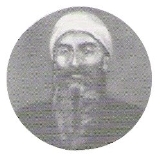
Mírzá Músá
Encyclopedia
Mírzá Músá surnamed Áqáy-i-Kalím (d.1887) was the only true brother of Bahá'u'lláh
, meaning that they shared the same mother. He was later named by Shoghi Effendi
as one of the nineteen Apostles of Bahá'u'lláh
.
 The life of Mírzá Músá was so inextricably bound up with that of Bahá'u'lláh himself, that his life and background mirror the life and travels of Bahá'u'lláh. He was an integral part of correspondence between Bahá'u'lláh and the Bahá'ís. He experienced the same imprisonment, exile, assaults, and degrading circumstances that were given to the small band of family members associated with Bahá'u'lláh and `Abdu'l-Bahá
The life of Mírzá Músá was so inextricably bound up with that of Bahá'u'lláh himself, that his life and background mirror the life and travels of Bahá'u'lláh. He was an integral part of correspondence between Bahá'u'lláh and the Bahá'ís. He experienced the same imprisonment, exile, assaults, and degrading circumstances that were given to the small band of family members associated with Bahá'u'lláh and `Abdu'l-Bahá
. In the history of the Bahá'í cause, Mírzá Músá stands out as a loyal and faithful follower until the end.
Bahá'u'lláh used Mírzá Músá as an example to show his respect for the law. When an official expressed hesitation to inflict punishment on one of the followers of Bahá'u'lláh who had committed a crime, he replied:
, but later became "the most redoubtable adversary of `Abdu'l-Bahá" by supporting Mírzá Muhammad `Alí
, the arch-breaker of the Covenant. He was the one who read the Kitáb-i-'Ahd in front of the family upon the passing of Bahá'u'lláh.
Bahá'u'lláh
Bahá'u'lláh , born ' , was the founder of the Bahá'í Faith. He claimed to be the prophetic fulfilment of Bábism, a 19th-century outgrowth of Shí‘ism, but in a broader sense claimed to be a messenger from God referring to the fulfilment of the eschatological expectations of Islam, Christianity, and...
, meaning that they shared the same mother. He was later named by Shoghi Effendi
Shoghi Effendi
Shoghí Effendí Rabbání , better known as Shoghi Effendi, was the Guardian and appointed head of the Bahá'í Faith from 1921 until his death in 1957...
as one of the nineteen Apostles of Bahá'u'lláh
Apostles of Bahá'u'lláh
The Apostles of Bahá'u'lláh were nineteen eminent early followers of Bahá'u'lláh, the founder of the Bahá'í Faith. The apostles were designated as such by Shoghi Effendi, the Guardian of the Bahá'í Faith, and the list was included in The Bahá'í World, Vol...
.

`Abdu'l-Bahá
‘Abdu’l-Bahá , born ‘Abbás Effendí, was the eldest son of Bahá'u'lláh, the founder of the Bahá'í Faith. In 1892, `Abdu'l-Bahá was appointed in his father's will to be his successor and head of the Bahá'í Faith. `Abdu'l-Bahá was born in Tehran to an aristocratic family of the realm...
. In the history of the Bahá'í cause, Mírzá Músá stands out as a loyal and faithful follower until the end.
Bahá'u'lláh used Mírzá Músá as an example to show his respect for the law. When an official expressed hesitation to inflict punishment on one of the followers of Bahá'u'lláh who had committed a crime, he replied:
- "Tell him, no one in this world can claim any relationship to Me except those who, in all their deeds and in their conduct, follow My example, in such wise that all the peoples of the earth would be powerless to prevent them from doing and saying that which is meet and seemly... This brother of Mine, this Mirza Musa, who is from the same mother and father as Myself, and who from his earliest childhood has kept Me company, should he perpetrate an act contrary to the interests of either the state or religion, and his guilt be established in your sight, I would be pleased and appreciate your action were you to bind his hands and cast him into the river to drown, and refuse to consider the intercession of any one on his behalf."
- (Shoghi Effendi, God Passes By, p. 133)
Family
Mírzá Músá's son, Mirza Majdi'd-Din for a time transcribed the Tablets of Bahá'u'lláhTablets of Bahá'u'lláh
The Tablets of Bahá’u’lláh Revealed After the Kitáb-i-Aqdas are selected tablets written by Bahá'u'lláh, the founder of the Bahá'í Faith, and published together as of 1978....
, but later became "the most redoubtable adversary of `Abdu'l-Bahá" by supporting Mírzá Muhammad `Alí
Mírzá Muhammad `Alí
Mírzá Muhammad `Alí was one of the sons of Bahá'u'lláh, the founder of the Bahá'í Faith. He was born from his father's second wife, Fatimih Khanum, whom Bahá'u'lláh married in Tehran in 1849, and she was later known as Mahd-i-'Ulya....
, the arch-breaker of the Covenant. He was the one who read the Kitáb-i-'Ahd in front of the family upon the passing of Bahá'u'lláh.

